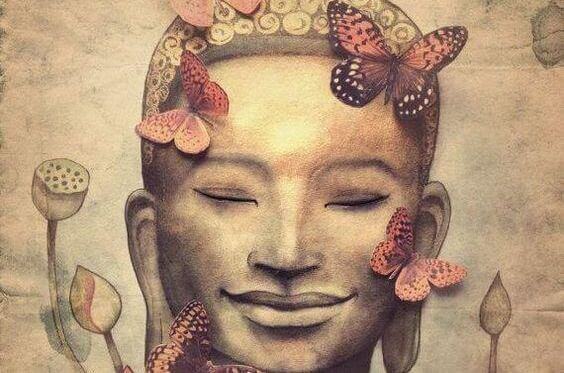Buddhist Psychology Can Help You Handle Painful Feelings


Written and verified by the psychologist Gema Sánchez Cuevas
Painful feelings are part of life. We have a tendency to shut ourselves up inside, not knowing what to do or how to react. This is an area where Buddhist psychology can be a huge help.
When you’re going through a bad time, often it’s the support of the people around you that keeps you afloat and helps you move forward. But what about when you don’t have close friends or family or their support? That’s when it’s time to dig into what Buddhist psychology can do for you.
It exists to put an end to human suffering
We usually see Buddhism as a major religion in the Eastern world. But 2,500 years ago, the movement was born as a philosophical and psychological system, not a religion. In fact, according to the ascetic monk Siddhartha Gautama (known as the Buddha), Buddhism is the science of the mind.
Buddha founded this school of thought to show people a way to eradicate our suffering. He uses hypotheses and a thought structure that can be very useful for understanding and accepting your emotions.

The 4 noble truths of Buddhist psychology
Buddhist psychology is based on an idea that might seem pessimistic, but it’s inspiring: the nature of human life is suffering. Based on this idea, he says there are four noble truths. Most of the teachings of Buddhist psychology are contained in these truths. They’re the basis for the Buddhist meditation system too:
- First, suffering exists.
- Suffering has a cause.
- And suffering can be ended if its cause is extinguished.
- Finally, to do that, we have to follow the eightfold path.
Eradicating our suffering, or “dukkha”
To face difficult situations and eradicate pain, Buddhist psychology says we have to understand its root. Then only once we’ve determined the cause will we be able to free ourselves from our suffering. That’s the only way we’ll be able to see how pointless worrying and discouragement are.
“10% of life is made up of what happens to you...90% of life is decided by how you react.”
– Stephen R. Covey –
According to Buddhist psychology, we all have habits that have led us to ignore the truth of life. Put another way, we don’t know anything about the different processes and stages of life, and that’s what causes our suffering.
“Dukkha comes from desire, attachment, and ignorance. But it can be overcome.”
-Buddha-

Action ideas
The last of the four noble truths mentions the eightfold path. It’s a path composed of 8 branches, or action ideas that help you grow in harmony, balance, and total awareness. It’s usually portrayed in the form of the wheel of the dharma, each spoke symbolizing one element of the path. We can group these branches into three main categories:
- Wisdom: right view and resolve.
- Ethical behavior: right conduct, speech, and livelihood.
- Training of the mind. Right effort, concentration, and mindfulness or meditation.
These 8 ideas shouldn’t be seen as linear steps. Instead, you should work on all of them at the same time, as much as you’re able.
Misunderstanding happiness
We all want to be happy, but no one agrees on what exactly happiness is. Everyone has a different idea of what it is: climbing the ladder at work, material possessions, leaving a legacy… Thus, even when we do meet all these goals we’ve set for ourselves, we won’t feel complete.
When one of our desires is fulfilled, we move on to another and then another. Little by little we end up getting caught in an endless cycle. In the end, we follow the false hope of being happy.
The need to free ourselves from attachment
Buddhist psychology sees these desires built up in our heads as a major distraction. Our desires lead to attachment (to people, material things, beliefs…). In fact, this is exactly what causes the greatest suffering.
When we get attached, what we’re doing is identifying with other objects or people and losing our own identity. In other words, we forget about who we are and what we really need as human beings.
Buddhism gives you tools to use to work through attachment and find understanding. Only once you’ve gotten to that point will you understand what else you need (personal growth, harmony in your emotions) and go through life more consciously.

How do you stop suffering?
Through meditation. Buddhist reflection practices are meant to increase your understanding and wisdom and eradicate suffering. While specific techniques vary between schools and traditions, they all have the same end goal. The point is to reach a state of maximum awareness and peace.
These are the main movements of Buddhism that can help you when you’re in pain.
- Theravada is analytical. It describes the different psychological or meditative states and structures the meditation experience.
- Zen focuses on the spontaneity and intuition of wisdom. The purpose is for you to find your natural harmony and avoid dualism in your understanding of reality.
- Tibetan is all about deeply understanding reality. It focuses on the unconscious and symbolic mechanisms of your mind. It’s the most symbolic and mystical of all the Buddhist traditions.
- Pure Land Buddhism highlights devotion, humility, and gratitude as direct paths to spiritual fulfillment. It’s a kind of devotional meditation with mantras at its center.
Buddhism urges you to openly relate to your emotions. To be aware of them, express them, and accept them. They’re part of your life, but just like everything else, they can change, so there’s no need to try to control them.
Painful feelings are part of life. We have a tendency to shut ourselves up inside, not knowing what to do or how to react. This is an area where Buddhist psychology can be a huge help.
When you’re going through a bad time, often it’s the support of the people around you that keeps you afloat and helps you move forward. But what about when you don’t have close friends or family or their support? That’s when it’s time to dig into what Buddhist psychology can do for you.
It exists to put an end to human suffering
We usually see Buddhism as a major religion in the Eastern world. But 2,500 years ago, the movement was born as a philosophical and psychological system, not a religion. In fact, according to the ascetic monk Siddhartha Gautama (known as the Buddha), Buddhism is the science of the mind.
Buddha founded this school of thought to show people a way to eradicate our suffering. He uses hypotheses and a thought structure that can be very useful for understanding and accepting your emotions.

The 4 noble truths of Buddhist psychology
Buddhist psychology is based on an idea that might seem pessimistic, but it’s inspiring: the nature of human life is suffering. Based on this idea, he says there are four noble truths. Most of the teachings of Buddhist psychology are contained in these truths. They’re the basis for the Buddhist meditation system too:
- First, suffering exists.
- Suffering has a cause.
- And suffering can be ended if its cause is extinguished.
- Finally, to do that, we have to follow the eightfold path.
Eradicating our suffering, or “dukkha”
To face difficult situations and eradicate pain, Buddhist psychology says we have to understand its root. Then only once we’ve determined the cause will we be able to free ourselves from our suffering. That’s the only way we’ll be able to see how pointless worrying and discouragement are.
“10% of life is made up of what happens to you...90% of life is decided by how you react.”
– Stephen R. Covey –
According to Buddhist psychology, we all have habits that have led us to ignore the truth of life. Put another way, we don’t know anything about the different processes and stages of life, and that’s what causes our suffering.
“Dukkha comes from desire, attachment, and ignorance. But it can be overcome.”
-Buddha-

Action ideas
The last of the four noble truths mentions the eightfold path. It’s a path composed of 8 branches, or action ideas that help you grow in harmony, balance, and total awareness. It’s usually portrayed in the form of the wheel of the dharma, each spoke symbolizing one element of the path. We can group these branches into three main categories:
- Wisdom: right view and resolve.
- Ethical behavior: right conduct, speech, and livelihood.
- Training of the mind. Right effort, concentration, and mindfulness or meditation.
These 8 ideas shouldn’t be seen as linear steps. Instead, you should work on all of them at the same time, as much as you’re able.
Misunderstanding happiness
We all want to be happy, but no one agrees on what exactly happiness is. Everyone has a different idea of what it is: climbing the ladder at work, material possessions, leaving a legacy… Thus, even when we do meet all these goals we’ve set for ourselves, we won’t feel complete.
When one of our desires is fulfilled, we move on to another and then another. Little by little we end up getting caught in an endless cycle. In the end, we follow the false hope of being happy.
The need to free ourselves from attachment
Buddhist psychology sees these desires built up in our heads as a major distraction. Our desires lead to attachment (to people, material things, beliefs…). In fact, this is exactly what causes the greatest suffering.
When we get attached, what we’re doing is identifying with other objects or people and losing our own identity. In other words, we forget about who we are and what we really need as human beings.
Buddhism gives you tools to use to work through attachment and find understanding. Only once you’ve gotten to that point will you understand what else you need (personal growth, harmony in your emotions) and go through life more consciously.

How do you stop suffering?
Through meditation. Buddhist reflection practices are meant to increase your understanding and wisdom and eradicate suffering. While specific techniques vary between schools and traditions, they all have the same end goal. The point is to reach a state of maximum awareness and peace.
These are the main movements of Buddhism that can help you when you’re in pain.
- Theravada is analytical. It describes the different psychological or meditative states and structures the meditation experience.
- Zen focuses on the spontaneity and intuition of wisdom. The purpose is for you to find your natural harmony and avoid dualism in your understanding of reality.
- Tibetan is all about deeply understanding reality. It focuses on the unconscious and symbolic mechanisms of your mind. It’s the most symbolic and mystical of all the Buddhist traditions.
- Pure Land Buddhism highlights devotion, humility, and gratitude as direct paths to spiritual fulfillment. It’s a kind of devotional meditation with mantras at its center.
Buddhism urges you to openly relate to your emotions. To be aware of them, express them, and accept them. They’re part of your life, but just like everything else, they can change, so there’s no need to try to control them.
This text is provided for informational purposes only and does not replace consultation with a professional. If in doubt, consult your specialist.







